
Funeral poems for the grieving
When a loved one passes away, it can feel like all joy leaves the world with them, as well as any words to articulate that grief. In these moments, we often end up saying “I have no words,” and of course, that’s perfectly OK. But sometimes you want to express the rage and sorrow that come with death and also honor the beautiful life that once was. Poets have been writing about death since the beginning of the written word, and it’s no wonder their poems often appear at funerals. Not only do funeral poems help people process the loss of a loved one, but they also provide comfort to those left behind.
We’ve rounded up 40 moving poems to read at a funeral, share with someone who has lost a loved one or help you mourn. Some of these are short poems, while others are excerpts from longer poetry books that you can also gift to those who are struggling to cope in trying times. You may also find comfort in these sweet poems for kids or these stirring love poems, a roundup of love poems for her, love poems for him—poetry for pretty much everyone in your life.
It’s important to note that grief never leaves us, and no poem, as perfectly written as it may be, will allow us to “move on” completely. But poetry both sad and hopeful can help with the healing journey, and no matter what you believe comes after death, these words can offer validation and peace.
Get Reader’s Digest’s Read Up newsletter for more poetry, humor, cleaning, travel, tech and fun facts all week long.
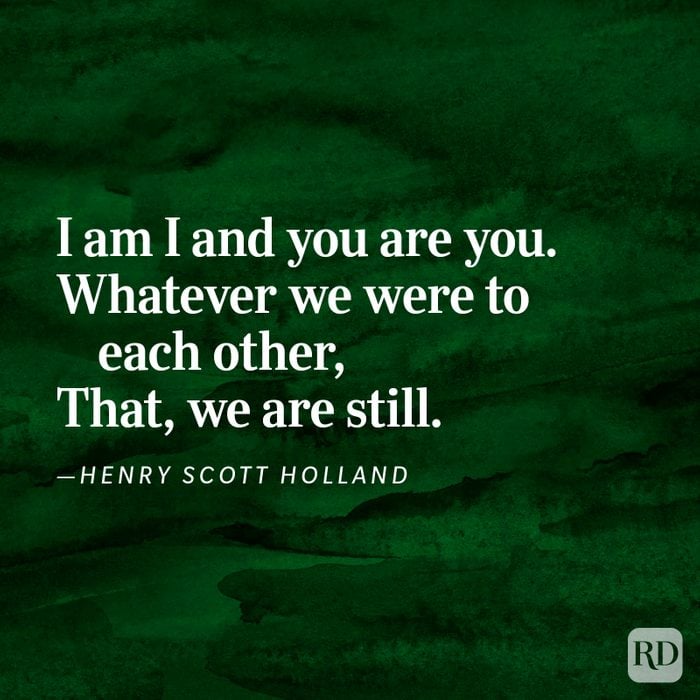
1. “Death Is Nothing at All” by Henry Scott Holland
Death is nothing at all.
I have only slipped away to the next room.
I am I and you are you.
Whatever we were to each other,
That, we are still.
Call me by my old familiar name.
Speak to me in the easy way
which you always used.
Put no difference into your tone.
Wear no forced air of solemnity or sorrow.
Laugh as we always laughed
at the little jokes we enjoyed together.
Play, smile, think of me. Pray for me.
Let my name be ever the household word
that it always was.
Perhaps one of the most beloved funeral poems, “Death Is Nothing at All” is written from the perspective of the person who has passed away. It wasn’t originally written as a poem, though; it was an excerpt from a sermon delivered in 1910 by English clergyman Henry Scott Holland (1847–1918) upon the death of King Edward VII. Since then, the passage has reminded countless mourners that our loved ones are never truly gone, which is perhaps the most comforting thing to say at a funeral. If you’re still searching for the right words, check out these thoughtful condolence messages.

2. “On the Death of a Young Lady of Five Years of Age” by Phillis Wheatley
From dark abodes to fair etherial light
Th’ enraptur’d innocent has wing’d her flight;
On the kind bosom of eternal love
She finds unknown beatitude above.
This know, ye parents, nor her loss deplore,
She feels the iron hand of pain no more;
The dispensations of unerring grace,
Should turn your sorrows into grateful praise
Considered the first published Black poet, Phillis Wheatley (1753–1784) learned to read and write from the Wheatleys, a prominent family in Boston who purchased her as a slave when she was a young girl. Her brilliant and moving poetry won international acclaim and became the basis of many arguments for the abolition of slavery (she was emancipated shortly after publishing her first poetry collection). In “On the Death of a Young Lady of Five Years of Age,” Wheatley seeks to provide hope and light in the dark for the parents of a 5-year-old girl, assuring them that their daughter is free from pain and happy in heaven.

3. “Requiescat” by Oscar Wilde
Tread lightly, she is near
Under the snow,
Speak gently, she can hear
The daisies grow.
All her bright golden hair
Tarnished with rust,
She that was young and fair
Fallen to dust.
Lily-like, white as snow,
She hardly knew
She was a woman, so
Sweetly she grew.
Coffin-board, heavy stone,
Lie on her breast,
I vex my heart alone
She is at rest.
Peace, Peace, she cannot hear
Lyre or sonnet,
All my life’s buried here,
Heap earth upon it.
While Irish writer and poet Oscar Wilde (1854–1900) is known for his sharp wit, lush aestheticism and salacious reputation, his poem “Requiescat” is a quiet, mournful remembrance poem about his dear sister Isola, who died at just 10 years old. Remembrance poems are poems addressed to or written about a loved one who has passed away, and Wilde’s “Requiescat” (Latin for “he/she may rest”) describes his sister as young, beautiful and sweet. It explores the conflicting heartache of not wanting to let go of a loved one but knowing, and eventually accepting, that they must be buried. Read more of his poetry in the collection Complete Writings of Oscar Wilde—Poems.
The poem would make a wonderful addition to a sympathy card, but before you add a message, make sure you know the right things to say to someone who is grieving.

4. “My Beth” by Louisa May Alcott
Thus our parting daily loseth
Something of its bitter pain,
And while learning this hard lesson,
My great loss becomes my gain.
For the touch of grief will render
My wild nature more serene,
Give to life new aspirations,
A new trust in the unseen.
Henceforth, safe across the river,
I shall see forever more
A beloved, household spirit
Waiting for me on the shore.
Hope and faith, born of my sorrow,
Guardian angels shall become,
And the sister gone before me
By their hands shall lead me home.
“My Beth” is a fictional poem from the classic novel Little Women by Louisa May Alcott (1832-1888). Written by the book’s protagonist, Jo March, the poem is for her late sister Beth, whose sweet and pure nature continues to inspire the family long after she is gone. This excerpt shows how we can honor our dearly departed’s memories by learning from their best qualities and living our lives with kindness. Read the entire poem—and the entire novel while you’re at it—by picking up a copy of Little Women.

5. “Mother” by Luis G. Dato
When evenings cast pale shadows on the earth,
And silence, like a vast mysterious ghost,
Stifles the land and sea from hill to coast,
And buries all that tropic suns gave birth,
When by myself I pace the darkened shore,
And think of this unhappy lot of mine,
The pain and grief the fates to me assign,
I sigh for you, O mother I adore!
That I could seek your bosom as of old,
And, nestling there, bare secrets that oppress,
Accuse these that my love would dispossess,
Whose hearts to cold desires and base are sold!
O mother dear! When death relieves our sighs,
Shall we in heaven, meet, in Paradise?
The loss of a mother can be especially painful, and “Mother” by Filipino poet Luis G. Dato (1906–1985) captures how bleak the world can seem when you lose the person who soothed you, raised you and loved you unconditionally. The couplet at the end of the poem offers solace, however, that one day the poet will meet his mother again in heaven. Dato was only 20 years old when he wrote Manila: A Collection of Verse, establishing himself as one of the first Filipinos to publish his poems in English.
The poem is a good reminder to show your appreciation for the maternal figures in your life while they’re still with you. Sharing some Mother’s Day poems (any time of year!) is a good start.

6. “Homage to Darío” by Arturo Giménez Pastor
Let no loud weeping chill the budding bloom,
That elves and nymphs have wreathed about his tomb,
The gentle Syrinx mourns his shortened years,
And on his laurels Pan sheds quiet tears;
In the cathedral raise the exile’s Psalm,
That through the transepts breathes like sorrow’s balm,
And in the tinted window rises calm
The Archer Boy
And now the band of those who loved him best
Follows him slowly to his place of rest.
Filled with stunning, fantastical imagery, “Homage to Darío” by Argentine writer and poet Arturo Giménez Pastor (1872–1948) is a gorgeous elegy in which all kinds of magical creatures come to pay their respects in a funeral procession. We can only assume that Darío was taken when he was too young and that he was someone admired by many. Read the full poem, which was translated from Spanish by Agnes Blake Poor, on the Academy of American Poets site.
If you’re looking for poetry of a different sort, don’t miss these funny limericks and limerick examples.

7. “O Captain! My Captain!” by Walt Whitman
O Captain! my Captain! rise up and hear the bells;
Rise up—for you the flag is flung—for you the bugle trills,
For you bouquets and ribbon’d wreaths—for you the shores a-crowding,
For you they call, the swaying mass, their eager faces turning;
Here Captain! dear father!
This arm beneath your head!
It is some dream that on the deck,
You’ve fallen cold and dead.
My Captain does not answer, his lips are pale and still,
My father does not feel my arm, he has no pulse nor will,
The ship is anchor’d safe and sound, its voyage closed and done,
From fearful trip the victor ship comes in with object won;
Exult O shores, and ring O bells!
But I with mournful tread,
Walk the deck my Captain lies,
Fallen cold and dead.
Written in 1865 about the death of President Abraham Lincoln, Walt Whitman’s (1819–1892) famous “O Captain! My Captain!” poem uses an extended metaphor of a ship captain who has completed the voyage successfully—but at the cost of his life—to symbolize Lincoln’s victory in the Civil War. It’s a powerful poem that displays the enormous loss that reverberates through a community when a revered leader or patriarchal figure has died. (Fans of classic ’80s movies will no doubt recognize it from the iconic scene in Dead Poets Society.) You can read the whole poem in Whitman’s poetry collection Leaves of Grass.
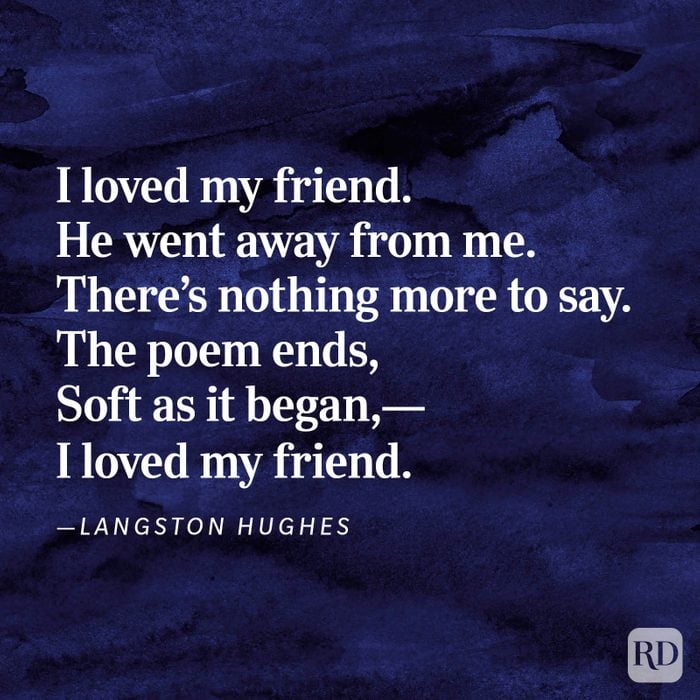
8. “Poem (To F.S.)” by Langston Hughes
I loved my friend.
He went away from me.
There’s nothing more to say.
The poem ends,
Soft as it began,—
I loved my friend.
Langston Hughes (1901–1967) was a Black poet and activist who rose to fame during the Harlem Renaissance of the 1920s. Dedicated to his friend “F.S.,” this short free-verse poem is as simple as it can get. Hughes does not dress his grief in flowery language or complex metaphors. Instead, he seems to say that sometimes there truly are no words that we can say, other than our love. The repetition of “I loved my friend” in the past tense is especially heartbreaking, and yet there’s a quiet strength in the affirmation. If you’re aiming to read more poems by Black poets at the top of their game, don’t miss these Amanda Gorman poems.
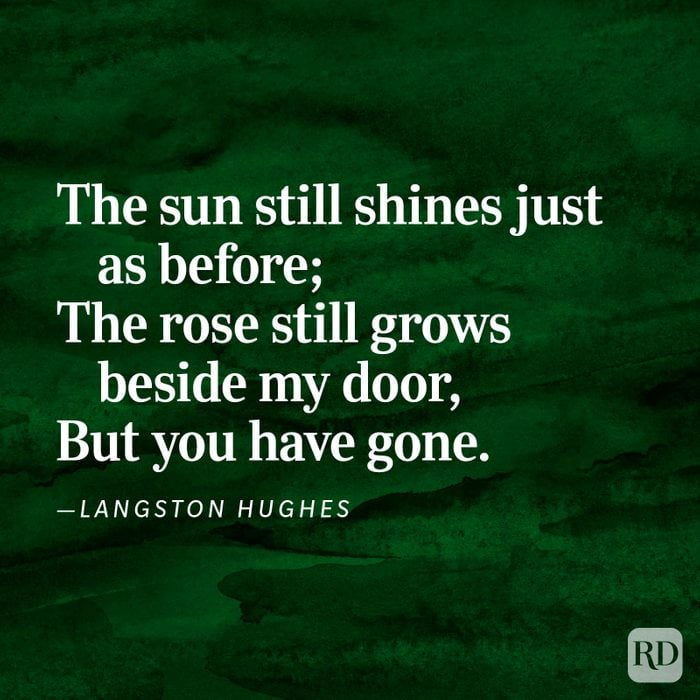
9. “To a Dead Friend” by Langston Hughes
The moon still sends its mellow light
Through the purple blackness of the night;
The morning star is palely bright
Before the dawn.
The sun still shines just as before;
The rose still grows beside my door,
But you have gone.
The sky is blue and the robin sings;
The butterflies dance on rainbow wings
Though I am sad.
In all the earth no joy can be;
Happiness comes no more to me,
For you are dead.
Whereas “Poem” is stark in its simplicity, “To a Dead Friend” explores the beauty of the world that continues to turn after we lose a loved one. It may seem like Langston Hughes is expressing bitterness at the existence of beauty during a joyless time, but the poem serves to remind us that life does go on, and eventually, so will we. You may not be ready to chuckle at funny roses-are-red poems so soon after a loss, but there will come a time when joy returns and, with it, laughter.

10. “Condolence” by Dorothy Parker
They hurried here, as soon as you had died,
Their faces damp with haste and sympathy,
And pressed my hand in theirs, and smoothed my knee,
And clicked their tongues, and watched me, mournful-eyed.
Gently they told me of that Other Side—
How, even then, you waited there for me,
And what ecstatic meeting ours would be.
Moved by the lovely tale, they broke, and cried.
And when I smiled, they told me I was brave,
And they rejoiced that I was comforted,
And left, to tell of all the help they gave.
But I had smiled to think how you, the dead,
So curiously preoccupied and grave,
Would laugh, could you have heard the things they said.
Leave it to Dorothy Parker to bring dark humor and irony to something as grave as death. One of the founding members of the Algonquin Round Table, Parker (1893–1967) was an American writer, satirist and critic renowned for her wit. Her poem “Condolence” is not for everyone, but it’s rather more appropriate for that specific someone who may not have been particularly religious and would have appreciated the comic relief. Read more of Parker’s funny poems in her 1926 poetry collection, Enough Rope: A Book of Light Verse.
![“[The cry of the cicada]” by Matsuo Bashō](https://www.rd.com/wp-content/uploads/2023/03/Comforting-Funeral-Poems-11.jpg?fit=700%2C700)
11. “[The cry of the cicada]” by Matsuo Bashō
The cry of the cicada
Gives us no sign
That presently it will die.
Recognized as the most famous poet of Edo period Japan, Matsuo Bashō (1643–1694) was the master of the haiku: short poems composed of a specific number of syllables. “The cry of the cicada” was translated by William George and is symbolic of the precious brevity of life. Although cicadas have fleeting lifespans, they do not dwell on or fear death but rather live life as fully as they can. It’s a lovely poem to read at a celebration of life.

12. “In Flanders Fields” by John McCrae
In Flanders fields the poppies blow
Between the crosses, row on row,
That mark our place; and in the sky
The larks, still bravely singing, fly
Scarce heard amid the guns below.
We are the Dead. Short days ago
We lived, felt dawn, saw sunset glow,
Loved and were loved, and now we lie
In Flanders fields.
Take up our quarrel with the foe:
To you from failing hands we throw
The torch; be yours to hold it high.
If ye break faith with us who die
We shall not sleep, though poppies grow
In Flanders fields.
Famous 1915 war poem “In Flanders Fields” was written in the literal trenches by Canadian doctor Lieutenant Colonel John McCrae (1872–1918) to commemorate the fallen soldiers. Named after the battlefields between Belgium and France, the poem honors the sacrifices of the dead, and yet it also shows how quickly beautiful poppy flowers grew over their graves. McCrae himself died in a military hospital in 1918, which makes the poem all the more haunting. And while it’s often associated with war and veterans, it’s also an inspirational poem for those left behind: It can be generally interpreted to urge the living to keep fighting against evil so that the deaths of our loved ones will not be in vain.

13. “The Gift of India” by Sarojini Naidu
Can ye measure the grief of the tears I weep
Or compass the woe of the watch I keep?
Or the pride that thrills thro’ my heart’s despair
And the hope that comforts the anguish of prayer?
And the far sad glorious vision I see
Of the torn red banners of Victory?
When the terror and tumult of hate shall cease
And life be refashioned on anvils of peace,
And your love shall offer memorial thanks
To the comrades who fought in your dauntless ranks,
And you honour the deeds of the deathless ones
Remember the blood of thy martyred sons!
Although not as well-known as “In Flanders Field,” Sarojini Naidu’s “The Gift of India” is also a World War I poem worth reading. The poet personifies India as a mother who both grieves over the sons she sent to war alongside Britain and honors their sacrifices with pride. Naidu (1879–1949) was an anti-imperialist political activist, feminist, poet and the first Indian woman to be president of the Indian National Congress. This excerpt is moving on its own, but the full poem is worth a read.

14. “A Mother to the War-Makers” by Margaret Widdemer
This is my son that you have taken,
Guard lest your gold-vault walls be shaken,
Never again to speak or waken.
This, that I gave my life to make,
This you have bidden the vultures break—
Dead for your selfish quarrel’s sake!
This that I built all of my years,
Made with my strength and love and tears,
Dead for pride of your shining spears!
Just for your playthings bought and sold
You have crushed to a heap of mold
Youth and life worth a whole world’s gold—
This was my son, that you have taken,
Guard lest your gold-vault walls be shaken—
This—that shall never speak or waken!
A stark contrast to “The Gift of India,” “A Mother to the War-Makers” by American poet and novelist Margaret Widdemer (1884–1978) captures the rage of a grieving mother. The speaker is furious at the injustice of her son’s life being taken away from her, reminding the world that every soldier is a son, every son has a mother, and his life was precious and loved.

15. “A Spring Dirge” by Ameen Rihani
Sad, sad, sad—
In vain thou comest, Spring;
Sad, sad, sad—
In vain thy birds all sing:
Perfumeless is thy rose;
Thy breeze, which softly blows,
Disturbs my sea of woes,
Ay, Death is on the wing.
Gone, gone, gone—
Go seek her, mocking Spring;
Gone, gone, gone—
Aside thy garlands fling;
Destroy thy laughing bower;
Call back an April shower
To weep with me this hour:
He came, not reckoning.
Love, love, love—
What sendest thou with Spring?
Love, love, love—
What tidings these birds bring!
They tell me they can hear
Thee, in a higher sphere;
But can that dry a tear,
Or give my wish a wing?
For many, spring is a welcome sign of life and new beginnings, but for the speaker of Ameen Rihani’s “A Spring Dirge,” it is a season that comes in vain. There seems to be no point in the birds singing and flowers growing when the speaker is in mourning. While he knows that his love is in heaven, it does not dry his tears or give him wings to go see her. Ameen Rihani (1876–1940) was a Syrian American writer and political activist who wrote in both English and Arabic. Once you’ve read all these funeral poems, check out Rihani’s 1905 poetry collection, From Myrtle and Myrrh, or the poems of heartbreak in Home by Whitney Hanson.
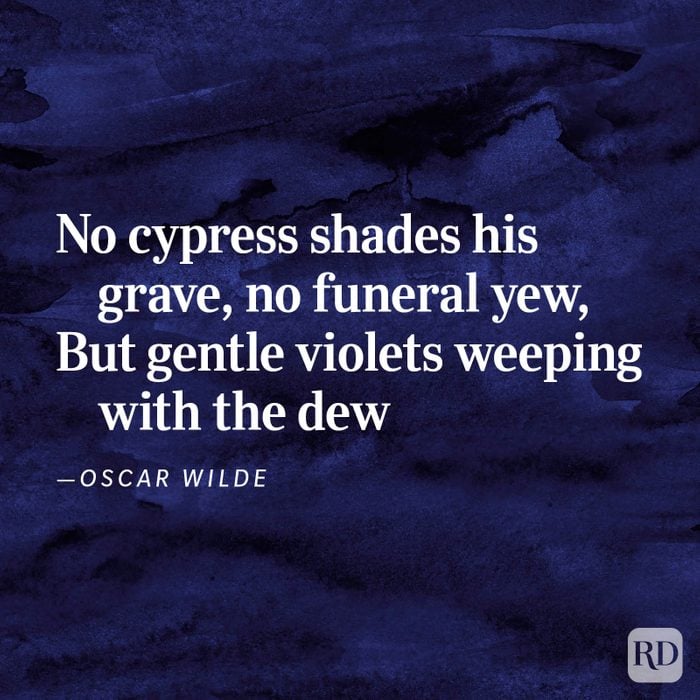
16. “The Grave of Keats” by Oscar Wilde
Rid of the world’s injustice, and his pain,
He rests at last beneath God’s veil of blue:
Taken from life when life and love were new
The youngest of the martyrs here is lain,
Fair as Sebastian, and as early slain.
No cypress shades his grave, no funeral yew,
But gentle violets weeping with the dew
Weave on his bones an ever-blossoming chain.
O proudest heart that broke for misery!
O sweetest lips since those of Mitylene!
O poet-painter of our English Land!
Thy name was writ in water—it shall stand:
And tears like mine will keep thy memory green,
As Isabella did her Basil-tree.
“The Grave of Keats” is a wistful Petrarchan sonnet written by Oscar Wilde (1854–1900) about the grave of his idol, English Romantic poet John Keats (1795–1821), who tragically died of tuberculosis in relative obscurity and poverty at just 25 years old. Wilde paints Keats as a martyr for art and love and says that in death, he is now free from injustice, pain and heartbreak. In the couplet at the end of the poem, Wilde promises to keep Keats’s memory alive, even if through his tears.

17. “Dead” by Winifred M. Letts
In misty cerements they wrapped the word
My heart had feared so long: dead… dead… I heard
But marvelled they could think the thing was true
Because death cannot be for such as you.
So while they spoke kind words to suit my need
Of foolish idle things my heart took heed,
Your racquet and worn-out tennis shoe,
Your pipe upon the mantel,—then a bird
Upon the wind-tossed larch began to sing
And I remembered how one day in Spring
You found the wren’s nest in the wall and said
“Hush!… listen! I can hear them quarrelling…”
The tennis court is marked, the wrens are fled,
But you are dead, beloved, you are dead
“Dead” by English-born Irish poet, novelist and playwright Winifred M. Letts (1882–1972) accurately captures the first stage of grief: denial. When the speaker first hears the news that her beloved is dead, she refuses to believe it; instead, her attention flits around the room to his belongings, which still lay strewn around the room and otherwise seem to be teeming with life, as if he will come back to pick them up. The last line, with its repetition of “you are dead,” suggests the speaker is realizing she must accept this new reality.

18. “Loss” by Winifred M. Letts
In losing you I lost my sun and moon
And all the stars that blessed my lonely night.
I lost the hope of Spring, the joy of June,
The Autumn’s peace, the Winter’s firelight.
I lost the zest of living, the sweet sense
Expectant of your step, your smile, your kiss;
I lost all hope and fear and keen suspense
For this cold calm, sans agony, sans bliss.
I lost the rainbow’s gold, the silver key
That gave me freedom of my town of dreams;
I lost the path that leads to Faërie
By beechen glades and heron-haunted streams.
I lost the master word, dear love, the clue
That threads the maze of life when I lost you.
If “Dead” captures the first stage of grief, “Loss” by Winifred M. Letts captures the fourth stage: depression. The speaker lists the many beautiful things that she lost when her love died, from the celestial bodies and rainbows in the sky to the seasons of the year, suggesting she has lost her sense of time while mourning. “Loss” is a poem that helps us express the feeling of being numb to emotions (both good and bad) and the loss of life’s zest, magic and meaning. Read this poem for a cathartic cry, or pick up one of these sad books that will tug at your heartstrings.

19. “Alive” by Winifred M. Letts
Because you live, though out of sight and reach,
I will, so help me God, live bravely too,
Taking the road with laughter and gay speech,
Alert, intent to give life all its due.
I will delight my soul with many things,
The humours of the street and books and plays,
Great rocks and waves winnowed by seagulls’ wings,
Star-jewelled Winter nights, gold harvest days.
I will for your sake praise what I have missed,
The sweet content of long-united lives,
The sunrise joy of lovers who have kissed,
Children with flower-faces, happy wives.
And last I will praise Death who gives anew
Brave life adventurous and love—and you.
Finally, after “Dead” and “Loss,” comes “Alive” by Winifred M. Letts, in which the speaker reaches the final stage of grief: acceptance. The poem starts with what seems like a paradoxical line about the enduring life of someone who has passed away. You could interpret it to mean her loved one lives on through memories or lives on in heaven. And with this source of comfort, the speaker vows to live life bravely for the sake of the dearly departed and to once again appreciate art, nature and the happiness that love provides. Most important, the speaker vows to praise the death that she once denied as not only a necessary part of the life cycle but one that allows for rebirth.
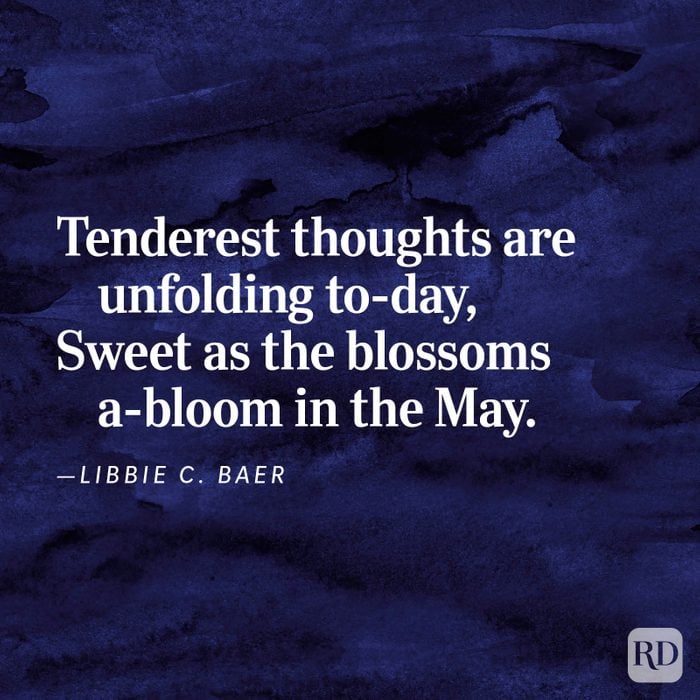
20. “Requiescat in Pace” by Libbie C. Baer
Cover with flowers the wound of the dart,
Fill it with flowers, the void in the heart;
Tenderest thoughts are unfolding to-day,
Sweet as the blossoms a-bloom in the May.
Think not of suffering, bloodshed and strife,
Think not of loss that hath come to thy life,
Think of the peace with suffering done,
Think of the glories their sacrifice won.
Latin for “Rest in peace,” “Requiescat in Pace” seeks to provide solace for the bereaved through short but gentle imperative sentences. Although American poet Libbie C. Baer (1849–1929) often wrote about patriotism, this poem can be applied to more situations than honoring soldiers. It reassures us that the beauty of flowers can help us heal from loss and urges us to focus on the accomplishments of the dearly departed and the fact that they’re finally at peace.

21. “Remember” by Christina Rossetti
Remember me when I am gone away,
Gone far away into the silent land;
When you can no more hold me by the hand,
Nor I half turn to go yet turning stay.
Remember me when no more day by day
You tell me of our future that you planned:
Only remember me; you understand
It will be late to counsel then or pray.
Yet if you should forget me for a while
And afterwards remember, do not grieve:
For if the darkness and corruption leave
A vestige of the thoughts that once I had,
Better by far you should forget and smile
Than that you should remember and be sad.
Written by Christina Rossetti (1830–1894), “Remember” highlights the perspective of someone who has passed away and does not want their loved one to be filled with sorrow. The speaker implores the ones they left behind to remember them fondly without darkness. In the 19th century, Rossetti found her voice as the youngest of a family of Italian English scholars. Surrounded by her accomplished parents and siblings, she rose to fame as one of the Victorian era’s greatest poets.
If you’re watching another’s grief from the outside, it can seem like there’s nothing you can do. But sending a card or sympathy gift—even simply offering a listening ear—can make a difference to the grieving. The same goes for sharing poem’s like Rossetti’s powerful “Remember.”

22. “The End” by D.H. Lawrence
If I could have put you in my heart,
If but I could have wrapped you in myself,
How glad I should have been!
And now the chart
Of memory unrolls again to me
The course of our journey here, here where we part.
And of, that you had never, never been
Some of your selves, my love, that some
Of your several faces I had never seen!
And still they come before me, and they go,
And I cry aloud in the moments that intervene.
And oh, my love, as I rock for you to-night,
And have not any longer and hope
To heal the suffering, or to make requite
For all your life of asking and despair,
I own that some of me is dead to-night.
English writer and poet D.H. Lawrence (1885–1930) may be remembered as the novelist who penned the controversial Lady Chatterley’s Lover, but he also wrote hundreds of short poems. In one such poem called “The End,” the speaker expresses his despair and heartache that he could not wrap his departed love in himself and keep her memory alive forever. He mourns having to part from her and never being able to see every aspect of her, and he accepts that a part of him has died alongside her.

23. “Consolation” by Robert Louis Stevenson
Though he, that ever kind and true,
Kept stoutly step by step with you,
Your whole long, gusty lifetime through,
Be gone a while before,
Be now a moment gone before,
Yet, doubt not, soon the seasons shall restore
Your friend to you.
He has but turned the corner — still
He pushes on with right good will,
Through mire and marsh, by heugh and hill,
That self-same arduous way —
That self-same upland, hopeful way,
That you and he through many a doubtful day
Attempted still.
He is not dead, this friend — not dead,
But in the path we mortals tread
Got some few, trifling steps ahead
And nearer to the end;
So that you too, once past the bend,
Shall meet again, as face to face, this friend
You fancy dead.
Push gaily on, strong heart! The while
You travel forward mile by mile,
He loiters with a backward smile
Till you can overtake,
And strains his eyes to search his wake,
Or whistling, as he sees you through the brake,
Waits on a stile.
Scottish writer Robert Louis Stevenson (1850–1894) has an extensive bibliography, from acclaimed novels Treasure Island and The Strange Case of Dr. Jekyll and Mr. Hyde to many short stories and poems. As its title suggests, “Consolation” is one of the most comforting funeral poems ever written, assuring mourners that rather than dead, their friend is just a few steps ahead on the mortal path and that they will meet again.
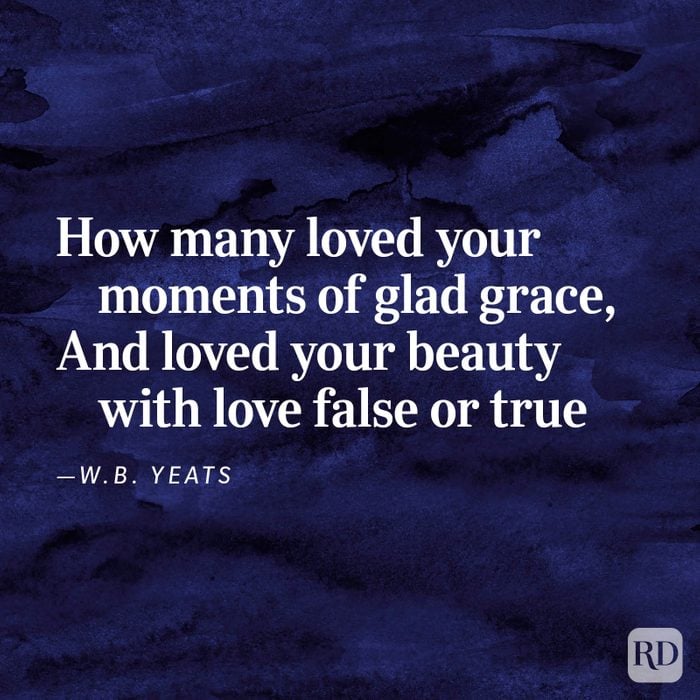
24. “When You Are Old” by W.B. Yeats
When you are old and grey and full of sleep,
And nodding by the fire, take down this book,
And slowly read, and dream of the soft look
Your eyes had once, and of their shadows deep;
How many loved your moments of glad grace,
And loved your beauty with love false or true,
But one man loved the pilgrim soul in you,
And loved the sorrows of your changing face
Although the full version of this poem technically isn’t about death, this excerpt of “When You Are Old” by Irish poet William Butler Yeats (1865–1939) is a moving passage to read at a funeral for a loved one who passed at an old age. The speaker believes that true love is watching and loving the object of your affection grow old, and he accepts that aging and death are a part of the natural life cycle.

25. “On the Death of Emily Jane Brontë” by Charlotte Brontë
My darling thou wilt never know
The grinding agony of woe
That we have bourne for thee,
Thus may we consolation tear
E’en from the depth of our despair
And wasting misery.
The nightly anguish thou art spared
When all the crushing truth is bared
To the awakening mind,
When the galled heart is pierced with grief,
Till wildly it implores relief,
But small relief can find.
Nor know’st thou what it is to lie
Looking forth with streaming eye
On life’s lone wilderness.
“Weary, weary, dark and drear,
How shall I the journey bear,
The burden and distress?”
Then since thou art spared such pain
We will not wish thee here again;
He that lives must mourn.
God help us through our misery
And give us rest and joy with thee
When we reach our bourne!
Author of the Gothic romance novel Jane Eyre, Charlotte Brontë (1816–1855) was the eldest of the famous English literary Brontë sisters, and sadly, she outlived her siblings at only 38 years old. While Jane Eyre may have been her magnum opus, “On the Death of Emily Jane Brontë” remains one of the most relatable funeral poems of the era. She wrote it for her sister, Emily (1818–1848), author of Wuthering Heights, five days after Emily died of tuberculosis at 30 years old. It is apparent in the poem how beloved Emily was, as well as how much pain she was in toward her death. At the end of the poem, Charlotte accepts that Emily is in a better place and that they will be reunited in heaven.

26. “On the Death of Anne Brontë” by Charlotte Brontë
There’s little joy in life for me,
And little terror in the grave;
I’ve lived the parting hour to see
Of one I would have died to save.
Calmly to watch the failing breath,
Wishing each sigh might be the last;
Longing to see the shade of death
O’er those belovèd features cast.
The cloud, the stillness that must part
The darling of my life from me;
And then to thank God from my heart,
To thank Him well and fervently;
Although I knew that we had lost
The hope and glory of our life;
And now, benighted, tempest-tossed,
Must bear alone the weary strife.
We can only imagine the pain that Charlotte Brontë felt losing her youngest sister, Anne (1820–1849) who died at 29 of tuberculosis, so soon after Emily and Branwell Brontë passed away. Anne was the author of Agnes Grey and The Tenant of Wildfell Hall, with the latter considered one of the first feminist novels. In “On the Death of Anne Brontë,” Charlotte expresses the conflicting feelings of wishing she had died instead of her sister but also thanking God for ending her sister’s pain. In the end, Charlotte accepts that she must bear the grief alone as the last surviving sibling.

27. “William and Emily” by Edgar Lee Masters
There is something about Death
Like love itself!
If with someone with whom you have known passion,
And the glow of youthful love,
You also, after years of life
Together, feel the sinking of the fire,
And thus fade away together,
Gradually, faintly, delicately,
As it were in each other’s arms,
Passing from the familiar room –
That is a power of unison between souls
Like love itself!
American attorney and poet Edgar Lee Masters (1868–1950) was known for his free verse poetry collection Spoon River Anthology, in which each poem is a monologue from the dead in a fictional Illinois graveyard. And while some might not necessarily be appropriate funeral poems, “William and Emily” is a sweet one that imagines a couple who lived a full life together and happily died of old age in each other’s arms.

28. “Dirge” by Edna St. Vincent Millay
Boys and girls that held her dear,
Do your weeping now;
All you loved of her lies here.
Brought to earth the arrogant brow,
And the withering tongue
Chastened; do your weeping now.
Sing whatever songs are sung,
Wind whatever wreath,
For a playmate perished young,
For a spirit spent in death.
Boys and girls that held her dear,
All you loved of her lies here.
“Dirge” by Edna St. Vincent Millay (1892–1950) minces no words when it comes to the act of mourning. In the wake of the loss of a loved one, especially a child, it’s not only hard to know how to support others in their grief, but it’s also difficult to know how to move forward yourself. For this reason, some may find comfort in the more authoritative voice of the poem’s speaker. She provides the guidance needed to express that sorrow and focus on what is important: acceptance and honoring the memory of our loved ones.

29. “On Death” by Kahlil Gibran
For what is it to die but to stand naked in the wind and to melt into the sun?
And what is it to cease breathing, but to free the breath from its restless tides, that it may rise and expand and seek God unencumbered?
Only when you drink from the river of silence shall you indeed sing.
And when you have reached the mountain top, then you shall begin to climb.
And when the earth shall claim your limbs, then shall you truly dance.
Part of why death can be so devastating is the idea of a final separation. But Lebanese American writer and poet Khalil Gibran (1883–1931) challenges this notion in “On Death.” Rather than focusing on being separated from loved ones or from his earthly existence, Gibran frames death as a return to nature and, as such, all that is comforting and beautiful. That comes through loud and clear in this excerpt, but it’s also worth reading the longer version of “On Death.” It’s one of 28 prose-poetry fables in Gibran’s acclaimed The Prophet, which was published in 1923.

30. “Warm Summer Sun” by Mark Twain
Warm summer sun,
Shine kindly here,
Warm southern wind,
Blow softly here.
Green sod above,
Lie light, lie light.
Good night, dear heart,
Good night, good night.
In this short poem, American writer Mark Twain (1835–1910) eschews any mention of death in order to evoke an atmosphere of ease and restfulness. Death isn’t some frightful specter or event, but a final sleep, one in which the speaker bids goodnight to his heart, which will finally be at peace after a life long lived. We can imagine the characters of Twain’s children’s novels—you likely know him best for The Adventures of Tom Sawyer and Adventures of Huckleberry Finn—reciting “Warm Summer Sun” as they stroll along the Mississippi River.
![“Song [When I am dead, my dearest]” by Christina Rossetti](https://www.rd.com/wp-content/uploads/2023/03/Comforting-Funeral-Poems-31.jpg?fit=700%2C700)
31. “Song [When I am dead, my dearest]” by Christina Rossetti
When I am dead, my dearest,
Sing no sad songs for me;
Plant thou no roses at my head,
Nor shady cypress tree:
Be the green grass above me
With showers and dewdrops wet;
And if thou wilt, remember,
And if thou wilt, forget.
I shall not see the shadows,
I shall not feel the rain;
I shall not hear the nightingale
Sing on, as if in pain:
And dreaming through the twilight
That doth not rise nor set,
Haply I may remember,
And haply may forget.
While many funeral poems tend to focus on the event or the remembrance of the departed, Christina Rossetti takes a different approach. In “Song,” the speaker seems all too aware that while the act of remembrance can comfort, it can also be painful. Her focus is instead on her loved ones achieving closure through her memory, a crucial part of the grieving process and one that can be helpful to keep in mind after a loss.
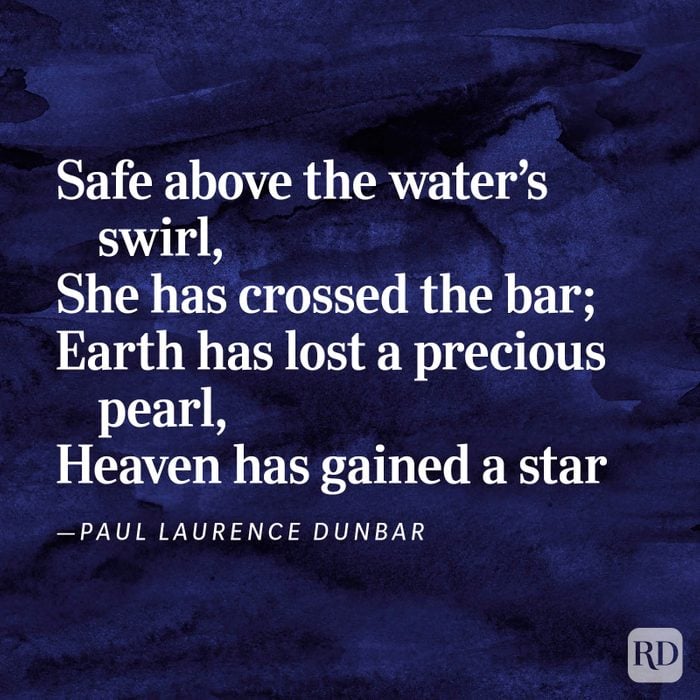
32. “Dirge” by Paul Laurence Dunbar
Lay her here beneath the grass,
Cool and green and sweet,
Where the gentle brook may pass
Crooning at her feet.
Nature’s bards shall come and sing,
And the fairest flowers shall spring
Where she lies.
Safe above the water’s swirl,
She has crossed the bar;
Earth has lost a precious pearl,
Heaven has gained a star,
That shall ever sing and shine,
Till it quells this grief of mine
For my love.
One of the first nationally recognized Black poets, Paul Laurence Dunbar (1872–1906) tackles the dichotomy between loss and peace in this poem. “Dirge” is filled with serene natural imagery, through which the poet crafts a sense of death as a gentle passing on. His love is “safe” above any mortal worry. And yet the last lines of the poem serve to swiftly acknowledge the plight of the grieving: the long road to closure as their love endures. Read the poem in its entirety in The Collected Poetry of Paul Laurence Dunbar. To find more comfort, read over these loss quotes.
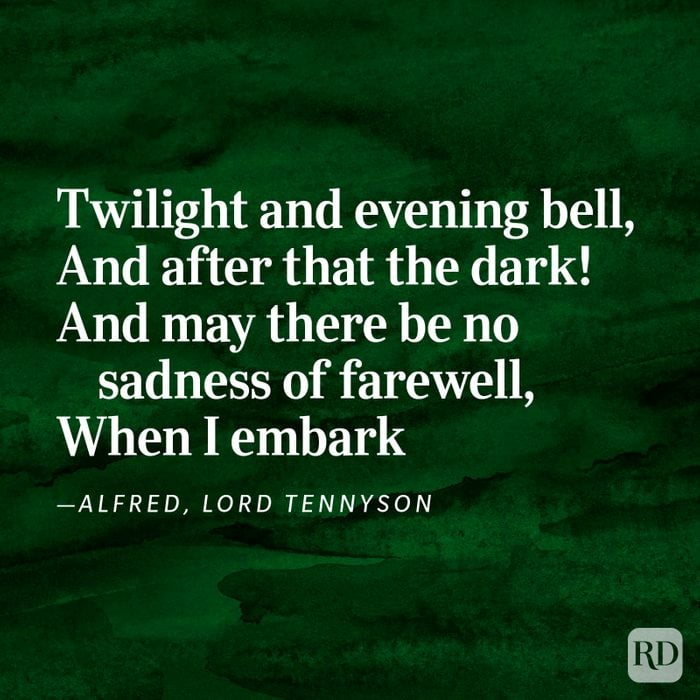
33. “Crossing the Bar” by Alfred, Lord Tennyson
Sunset and evening star,
And one clear call for me!
And may there be no moaning of the bar,
When I put out to sea,
But such a tide as moving seems asleep,
Too full for sound and foam,
When that which drew from out the boundless deep
Turns again home.
Twilight and evening bell,
And after that the dark!
And may there be no sadness of farewell,
When I embark;
For tho’ from out our bourne of Time and Place
The flood may bear me far,
I hope to see my Pilot face to face
When I have cross’d the bar.
One of the most famous funeral poems of all time, “Crossing the Bar” imagines Victorian poet Alfred Lord Tennyson (1809–1892) facing death courageously. The metaphorical “bar” in question is, of course, a sandbar between life and death, and Tennyson employs duality when it comes to the journey’s destination, acknowledging that he is leaving “home” but also going “home.” He asks his loved ones to not be sad at his departure but instead face it as he does: with faith that he will meet his benevolent creator at the end.

34. “Twilight Hours” by Sadakichi Hartmann
The colors of the rainbow are fading in the silent
and distant West, and the heartache of
twilight trembles within my aching breast.
For the light of my love has faded like sunbeams
in the West, and the color of twilight will
tremble forever in my breast.
I think of thy kindness often, when lonesome I feel
and cold, I have not forgotten our childhood,
nor your loving words of old.
And still my sweetest songs of life are floating
in dreams to thee, like whisperings at eventide,
across a clouded sea.
Written by German Japanese American poet Sadakichi Hartmann (1867–1944), “Twilight Hours” compares death to the fading twilight. Through the adept use of simile, Hartmann manages to capture the sadness of loss while avoiding a sense of finality. Death is not so much an ending as it is a veil through which the presence of the dead can still be felt in our dreams, and we can still seek comfort in their memories. By itself, this excerpt makes for a moving funeral poem, but “Twilight Hours” is also worth reading in its entirety.
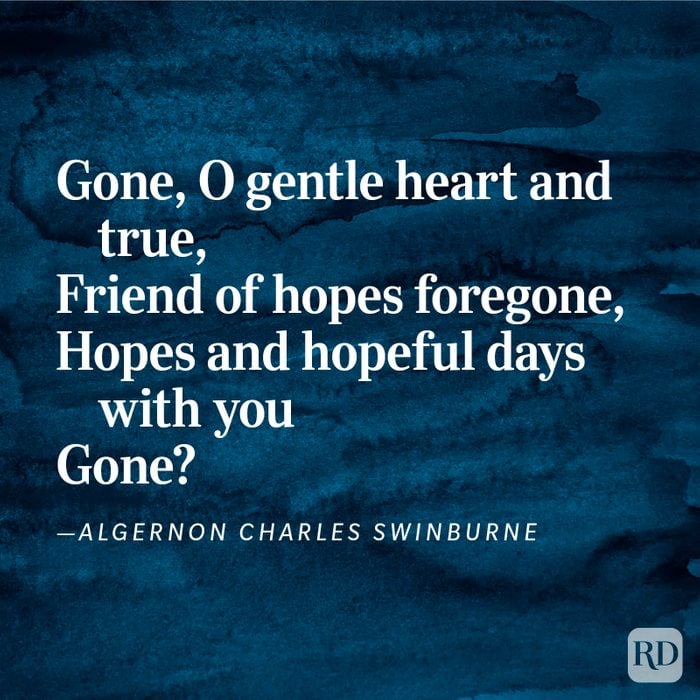
35. “A Dead Friend” by Algernon Charles Swinburne
Gone, O gentle heart and true,
Friend of hopes foregone,
Hopes and hopeful days with you
Gone?
Days of old that shone
Saw what none shall see anew,
When we gazed thereon.
Soul as clear as sunlit dew,
Why so soon pass on,
Forth from all we loved and knew
Gone?
This excerpt from “A Dead Friend” by English poet and playwright Algernon Charles Swinburne (1837–1909) accurately captures the disbelief that often accompanies sudden loss. The speaker laments that his pure-hearted and gentle friend—and, with him, hope—is gone. Yet the poem also immortalizes the sweet moments they once shared. You can read the full version on Project Gutenberg, an online library that makes it easy to read books for free.

36. “At a Friend’s Burial” by Antonio Machado
The thud of a coffin in the earth is something
entirely serious.
Over the black box dusty clumps
of earth crumbled.
The air rose from the
deep grave with a pale breath.
–And you, now without a shadow, sleep and rest,
a long peace to your bones…
For good,
sleep a tranquil and true sleep.
With its use of stark imagery and straightforward delivery, “At a Friend’s Burial” is a no-frills poem that vividly captures the undercurrent of anger that often accompanies the loss of a loved one. But while the opening stanzas are full of poignant observations, celebrated Spanish poet Antonio Machado (1875–1939) ends the poem on a hopeful note: Death means a good and tranquil sleep.

37. “In Memory of a Child” by Vachel Lindsay
I
The angels guide him now,
And watch his curly head,
And lead him in their games,
The little boy we led.
II
He cannot come to harm,
He knows more than we know,
His light is brighter far
Than daytime here below.
III
His path leads on and on,
Through pleasant lawns and flowers,
His brown eyes open wide
At grass more green than ours.
The death of a child is no easy thing to understand or accept. Perhaps that is why American poet Vachel Lindsay (1879–1931) chooses to frame the event as a transition from the mortal world to the infinite splendor of the afterlife. This is one of those funeral poems that takes utmost care to provide solace for the grieving parents, assuring them that their child is protected by angels now and that he is in a more beautiful place than the world he has left behind. Fortify yourself even further with these powerful strength quotes that will give you the courage to go on after a loss.

38. “Grown about by Fragrant Bushes” by Robert Louis Stevenson
Grown about by fragrant bushes,
Sunken in a winding valley,
Where the clear winds blow
And the shadows come and go,
And the cattle stand and low
And the sheep bells and the linnets
Sing and tinkle musically.
Between the past and the future,
Those two black infinities
Between which our brief life
Flashes a moment and goes out.
Nature features heavily in this gentle poem about loss by Robert Louis Stevenson. In “Grown about by Fragrant Bushes,” he juxtaposes the brevity of the human lifespan with pastoral imagery, providing a sense of serenity to the inevitability of death.
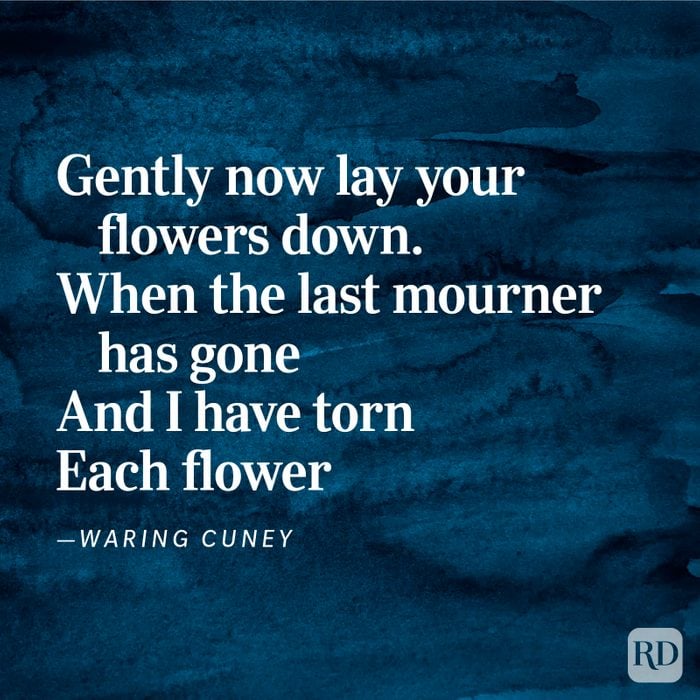
39. “Burial of the Young Love” by Waring Cuney
Gently now lay your flowers down.
When the last mourner has gone
And I have torn
Each flower;
When the last mourner has gone
And I have tossed
Broken stems and flower heads
To the winds . . . ah! . . .
I will gather withered leaves . . .
I will scatter withered leaves there.
Friends and lovers,
Do not weep.
Gently lay your flowers down . . .
Gently, now, lay your flowers down.
Friend of Langston Hughes during the Harlem Renaissance, Waring Cuney (1906–1962) was heavily influenced by blues music in his poetry. You can hear the gentle rhythm in “Burial of the Young Love” as the speaker repeatedly coaxes the mourners at his lover’s funeral to lay down their flowers on her coffin. Although he tells the mourners not to cry, his rage is palpable as he states his intention to stay behind and rip apart these flowers to scatter to the wind. It’s as if the narrator seeks to take the mourners’ pain and sadness and feel it all on their behalf so that they can move on. This is but an excerpt of the full poem, which you can find alongside other must-read poems in The Book of American Negro Poetry, an anthology edited by writer and civil rights activist James Weldon Johnson.
Those searching for poetry for other occasions will want to read these Thanksgiving poems and offer gratitude for the loved ones still with them.

40. “Sunday Morning” by Wallace Stevens
Death is the mother of beauty; hence from her,
Alone, shall come fulfilment to our dreams
And our desires. Although she strews the leaves
Of sure obliteration on our paths,
The path sick sorrow took, the many paths
Where triumph rang its brassy phrase, or love
Whispered a little out of tenderness,
She makes the willow shiver in the sun
For maidens who were wont to sit and gaze
Upon the grass, relinquished to their feet.
She causes boys to pile new plums and pears
On disregarded plate. The maidens taste
And stray impassioned in the littering leaves.
The celebrated 1923 poem “Sunday Morning” by Pulitzer Prize–winning American poet Wallace Stevens (1879–1955) may be about rebelling against organized religion when read in its entirety, but its passage about death makes it an inspiring funeral poem. In this excerpt, Stevens frames the inevitability of death as a key factor in what makes life so beautiful. Rather than focusing on aspects like grief and loss, Stevens uses each line to paint a picture of the human experience in all its depth, reminding us that the brevity of life makes everything all the more precious.
